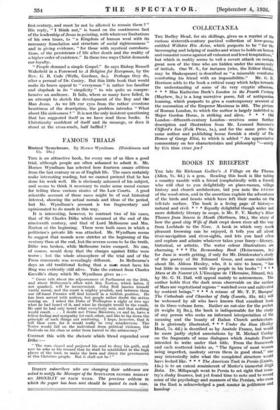FAMOUS TRIALS
Tins is an attractive book, for every one of us likes a good trial, although people are often ashamed to admit it. Mr. Horace Wyndham has selected here fourteen causes celebres from the last century or so of English life. The cases certainly make interesting reading, but we cannot pretend that he has done his work well. He is obviously ashamed of his subject, and seems to think it necessary to make some moral excuse for telling these curious stories of the Law Courts. A good scientific account of these cases might be of real historical interest, showing the actual morals and ideas of the period, but Mr. Wyndham's account is too fragmentary and opinionated to do much in this way.
It is interesting, however, to contrast two of hii cases, that of Sir Charles Dilke which occurred at the end of the nineteenth century, and that of Lord Melbourne and Mrs. Norton at the beginning. These were both cases in which a politician's private life was attacked. Mr. Wyndham seems to suggest that morals were stricter at the beginning of the century than at the end, but the reverse seems to be the truth. Dilke was broken, while Melbourne twice escaped. No one, of course, would deny that the charges against Dilke were worse ; but the whole atmosphere of the trial and of the
Press comments was revealingly different. In Melbourne's days an old traditional feeling that a man must have his fling was evidently still alive. Take the extract from Charles Greville's diary which Mr. Wyndham gives us :—
" Great talk about the adjournment of Parliament on the 20th, and about Melbourne's affair with Mrs. Norton, which latter, if not quashed, will be inconvenient. John Bull fancies himself vastly moral, and the court is mighty prudish, and, between them our off-hand Premier will find himself in a ticklish position. He has been served with notices, but people rather doubt the aetion, coming on. I asked the Duke of Wellington a night or two ago what he had heard of it, and what he thought would be the result. He said he had only heard what everybody said, and that nothing would result. . . . I doubt not Prime Ministers, ex and in, have a fellow-feeling and sympathy for each other, and like to lay down the principle of such things not mattering. - I hope, however, that it' will blow over, for it would really -be very -mischievous. The Tories would fall on the individual from political. violence, the Radicals on his class or order from hatred to the aristocracy."
Contrast this with the rhetoric which Stead expended nver Dilke .
"The man sinned and perjured his soul to deny his guilt, and now he asks as his reward that he shall be established in the higlx places of the land, to make the laws and direct the goveriament of this Christian people. But it shall not bo ! "


































 Previous page
Previous page